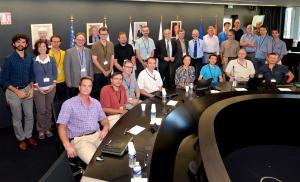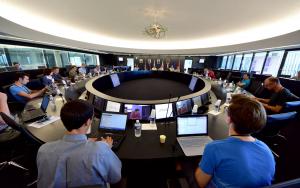The fellowship of fusion science
12 Sep 2016
-
K.D.
In January 2016, a call for nominations was launched for ITER Scientist Fellows—scientists working in the ITER Members who were willing to apply their expertise to solving some of ITER's high-priority research needs, particularly in the areas of simulation and theory.
The pioneer group of ITER Scientist Fellows and members of the ITER Science & Operations Department, with whom they will be working closely. (One Fellow could not be on site for the photo.)
Nine months later, in early September, the first group gathered in the Council Chamber of ITER Headquarters in order to agree on key issues for research, identify potential contributions from each scientist, and establish working and collaboration methodology.
The 19 Scientist Fellows that form ITER's pioneer group are leading experts from fusion laboratories and universities in Europe, Russia and the United States. They have been nominated by their heads of institutes and appointed by the ITER Director-General for a period of three years, renewable. While remaining employed at home, they will have long-term access to ITER Headquarters and spend part of their time on site working with ITER staff.
"To succeed during ITER exploitation it is essential that the members of the scientific community see ITER as 'their experiment,' and that they begin to make ITER's research program their own," stressed the ITER Director-General during his remarks at the start of the two-day workshop. "As the initial group of ITER Scientist Fellows, you have the opportunity not simply to carry out excellent scientific research, but also to shape this program and to take the lead in strengthening the framework that we have put into place."
It is expected that the Scientist Fellows will be spending an average of 25-30 percent of their time on ITER-related issues. They will be working in four priority research areas, defined as ELM control (for Edge Localized Modes), disruption mitigation, edge plasma modelling, and integrated modelling (focus areas which may expand as the program evolves).
During their first visit to ITER from 5 to 6 September, much of the time was spent in breakout sessions with group coordinators. "We discussed what plasma simulation capabilities we hope to develop for ITER and how each scientist sees his or her expertise as being applicable to solving our needs," said David Campbell, who heads the Science & Operations Department and coordinates the Scientist Fellow program. "The result is a multi-annual research program for each area with targeted annual goals."
The result of the two-day workshop in early September is a multi-annual research program for each area, with targeted annual goals.
Over time, the principal output of the ITER Scientist Fellow Network is expected in the form of papers published individually or jointly. Fellows will also play an important role in creating bridges with the fusion research community as they bring important ITER R&D issues back to their home institutes, and work in conjunction with Masters' and PhD researchers carrying out projects both at ITER and at home.
"I am expecting that quite a few of you sitting here today are going to play an active, possibly a leading role in ITER exploitation when the construction is complete," stressed Director-General Bigot. "The ITER Scientist Fellows' Network is intended to provide you with the opportunity to start playing an active role now and, in time, to be a member of the community that takes ownership of the ITER scientific program."
The work of the Network will complement the activities of the ITPA (International Tokamak Physics Activity), which primarily coordinates experimental work in support of ITER physics needs—making use of the ITER Members' fusion facilities and collating results.
"Our aim is to establish a halo of specialists working on, and contributing their expertise to, ITER's priority physics issues and propagating the ITER Project's research activities into the fusion research institutes of the ITER Members."
Nominations for the ITER Scientist Fellow Network (ISFN) are accepted on a rolling basis. For questions, please contact @email.
The first ITER Scientist Fellows have been nominated by the following institutes:
CEA Institute for Magnetic Fusion Research, IRFM (France)
EPFL Swiss Plasma Center (Switzerland)
EPFL Swiss Plasma Center (Switzerland)
EUROfusion VR/Chalmers
Forschungszentrum Jülich - Plasmaphysik (Germany)
Instytut Fizyki Plazmy i Laserowej Mikrosyntezy, Warsaw (Poland)
Kurchatov Institute (Russia)
Max-Planck-Institut für Plasmaphysik, Garching (Germany)
Technische Universiteit Eindhoven (The Netherlands)
UKAEA Culham Centre for Fusion Energy (UK)
Universidad Carlos III de Madrid (Spain)
University of Texas, Institute for Fusion Studies (US)
Forschungszentrum Jülich - Plasmaphysik (Germany)
Instytut Fizyki Plazmy i Laserowej Mikrosyntezy, Warsaw (Poland)
Kurchatov Institute (Russia)
Max-Planck-Institut für Plasmaphysik, Garching (Germany)
Technische Universiteit Eindhoven (The Netherlands)
UKAEA Culham Centre for Fusion Energy (UK)
Universidad Carlos III de Madrid (Spain)
University of Texas, Institute for Fusion Studies (US)



